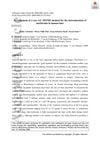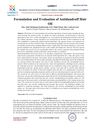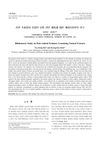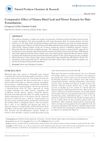 9 citations,
April 2019 in “Journal of structural biology”
9 citations,
April 2019 in “Journal of structural biology” Hair's internal fibers are arranged in a pattern that doesn't let much water in, and treatments like oils and heat change how much water hair can absorb.
 3 citations,
April 2018 in “Cosmetics”
3 citations,
April 2018 in “Cosmetics” As people get older, they have less active hair growth, but women have thicker hair than men and respond better to hair loss treatments.
 39 citations,
June 2019 in “Nanomaterials”
39 citations,
June 2019 in “Nanomaterials” Nanotube-based hair treatments could improve hair health and growth, and offer long-lasting effects.
 25 citations,
September 2014 in “Dermatologic Surgery”
25 citations,
September 2014 in “Dermatologic Surgery” Hair transplants can effectively treat hair loss from CCCA in African American women if there's no inflammation.
 1 citations,
July 2018 in “Elsevier eBooks”
1 citations,
July 2018 in “Elsevier eBooks” Avoid chemical and physical damage to protect hair.
 June 2024 in “Annals of Medicine and Surgery”
June 2024 in “Annals of Medicine and Surgery” A 23-year-old Syrian woman has two rare hair disorders, and avoiding hair treatments plus using vitamins and minoxidil may help.
 209 citations,
September 2008 in “Dermatologic Therapy”
209 citations,
September 2008 in “Dermatologic Therapy” Androgens can both increase and decrease hair growth in different parts of the body.
 20 citations,
January 2015 in “Current problems in dermatology”
20 citations,
January 2015 in “Current problems in dermatology” Hair gets thinner, grayer, and changes texture with age due to genetics, environment, and cellular changes, affecting the growth cycle.
 April 2024 in “Cosmetics”
April 2024 in “Cosmetics” Different oils affect hair flexibility and strength, with their impact varying on whether hair is virgin or bleached.
34 citations,
January 2011 in “Annals of dermatology/Annals of Dermatology” Using a hair dryer at 15 cm with continuous motion causes less damage than natural drying.
1 citations,
February 2024 in “Diversity” African plants can treat hair issues and may help with diabetes.
 2 citations,
January 2015 in “Elsevier eBooks”
2 citations,
January 2015 in “Elsevier eBooks” The document says biodegradable cosmetics and packaging are better for the environment and user experience.
 10 citations,
June 2019 in “International Journal of Cosmetic Science”
10 citations,
June 2019 in “International Journal of Cosmetic Science” Some plant-based chemicals may help with hair growth, but more research is needed to confirm their effectiveness.
7 citations,
October 2020 in “International Journal of Cosmetic Science” Different sizes of keratin peptides can strengthen hair, with smaller ones possibly increasing volume and larger ones repairing damage.
 501 citations,
October 2008 in “Psychoneuroendocrinology”
501 citations,
October 2008 in “Psychoneuroendocrinology” Hair cortisol levels can show increased stress during late pregnancy but only for up to six months.
 51 citations,
January 2004 in “Skin Pharmacology and Physiology”
51 citations,
January 2004 in “Skin Pharmacology and Physiology” The document explains hair growth and shedding, factors affecting it, and methods to evaluate hair loss, emphasizing the importance of skin biopsy for diagnosis.
 21 citations,
October 2014 in “Actas dermo-sifiliográficas/Actas dermo-sifiliográficas”
21 citations,
October 2014 in “Actas dermo-sifiliográficas/Actas dermo-sifiliográficas” Hair dyes can change hair color temporarily or permanently but may cause side effects like skin reactions and hair damage.
 14 citations,
June 2020 in “Drug Testing and Analysis”
14 citations,
June 2020 in “Drug Testing and Analysis” A new method was created to measure metformin in hair, showing potential for monitoring treatment and medical investigations.
 January 2025 in “International Journal of Advanced Research in Science Communication and Technology”
January 2025 in “International Journal of Advanced Research in Science Communication and Technology” The herbal hair oil effectively promotes hair growth, reduces dandruff, and is safe for all hair types.
 July 2024 in “Annals of Phytomedicine An International Journal”
July 2024 in “Annals of Phytomedicine An International Journal” Herbal ingredients like aloe vera and hibiscus can help with hair problems like hair loss and dandruff.
 August 2023 in “Han'gug miyong haghoeji/Journal of the Korean society of cosmetology”
August 2023 in “Han'gug miyong haghoeji/Journal of the Korean society of cosmetology” More research is needed on natural hair products, especially clinical studies.
 December 2023 in “International Journal For Multidisciplinary Research”
December 2023 in “International Journal For Multidisciplinary Research” Indian medicinal plants can help with hair growth and common hair issues.
 July 2021 in “British Journal of Dermatology”
July 2021 in “British Journal of Dermatology” Low testosterone levels may contribute to female pattern hair loss in men.
 20 citations,
September 2018 in “Journal of colloid and interface science”
20 citations,
September 2018 in “Journal of colloid and interface science” Modified keratin binds better to hair, especially bleached hair.
 January 2021 in “Natural Products Chemistry & Research”
January 2021 in “Natural Products Chemistry & Research” Combining Datura metel leaf and flower extracts can enhance hair growth without skin irritation.
 November 2017 in “Elsevier eBooks”
November 2017 in “Elsevier eBooks” PCOS is a genetic disorder affecting women's reproductive health, with treatments focused on symptoms like insulin resistance and fertility.

Hair loss in African American women, caused by hair care, genetics, and environment, needs more research for better treatment.
13 citations,
May 2021 in “FASEB bioAdvances” Plant-based products can improve hair and skin health without harmful side effects.
February 2024 in “Medicina” AFM can diagnose hair disorders by revealing detailed hair surface changes.
December 2023 in “Asian journal of beauty & cosmetology”























